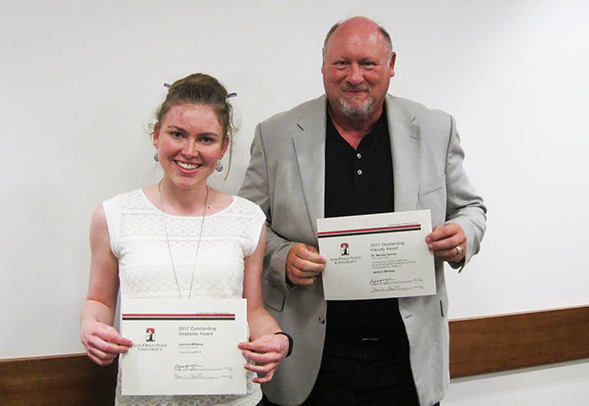Cracking the Code on Sex Trafficking
SDSU researchers are cracking the code sex traffickers use in online advertisements.

Murray Jennex, a management information systems professor in San Diego State University’s Fowler College of Business, and graduate student Jessica Whitney have developed a strategy to crack the code on these illegal trades making the jobs of law enforcement much easier.
“Sex trafficking is happening all over the world, and many of these victims are children who have their innocence taken away,” said Whitney. “Part of the reason we’re doing this is to help bring that innocence back to them.”
The duo took a set of approximately 8,700 advertisements off of Backpage listed in San Diego, Los Angeles and Orange County, and compared them to the findings from a 2015 thesis produced by one of Jennex’s previous students, Marisa Hultgren, whose research revealed keywords pimps were using to traffic their victims.
“We used Marisa Hultgren’s original work as a Rosetta Stone when we were de-coding all of the more recent advertisements,” said Jennex. “We ran our data set against our previously analyzed data and found a significant relationship.”
Pimps realized law enforcement officials caught on to which words they were using as encryptions, so they switched to emojis.
“It’s more difficult to track emojis since they’re encoded in a way that we can’t search in an automated fashion like we can with words” said Whitney.
They narrowed it down to 35 data points that regularly used a set of emojis, including symbols that represented the age of minors and other characteristics of the trafficking victims.
“We’ve discovered that the national symbol emojis are used to represent the ethnicity of the victim.” said Jennex. “Approximately 70 percent of the people trafficked are Americans.”
They are currently working on publishing an article for an information systems conference in order to gain more external validation.
Their next goal is to create an artificial intelligence system that can regularly detect these advertisements on an ongoing basis, and to work with law enforcement officials to continue rescuing victims of sex trafficking.
Thirty-five victims is 35 too many,” said Jennex. “Our attitude is that nobody should be forced into this hardship.”



